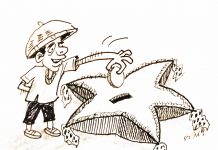
Ignorance is often deemed a flaw, a gap we’re meant to fill. But in a world overflowing with information, I wonder if there’s more to ignorance than just a void waiting to be occupied. Could it hold a peculiar wisdom? There is an odd kind of clarity in accepting what we don’t know, a release from the pressure to feign understanding or to constantly chase every detail. Taking a stand for ignorance doesn’t mean glorifying stupidity; it’s about respecting the spaces of mystery that keep us humble and sometimes even safer.
I think of how eager we can be to “know it all”—the latest news, the latest theories, the juiciest gossip. But we don’t realize how carrying every bit of knowledge is like wearing armor made of bricks; it might protect us, but it will eventually drag us down. Take my friend, who recently insisted on reading every article about climate doom. By the end, she was like a plant wilting under too much sun. It’s not that she didn’t care about the planet before; it’s that she was drowning in awareness, and somehow, all that knowledge just immobilized her. There was something wise about how her father, who’d lived through tougher, simpler times, managed his ignorance. He just kept planting trees. “What if it’s all for nothing?” she once asked him. He laughed and said he didn’t have the time to worry about it. Ironically, the fewer “facts” he knew, the more he was moved to act.
Ignorance also keeps us open to wonder, to mystery. When I was a child, I could sit for hours by the river, watching water bugs skitter across the surface, content with the vague mystery of how they stayed afloat. Now that I know all about surface tension, something is lost; I can still watch, but the feeling is different. That unknowing wasn’t just ignorance—it was enchantment. It made the world big and me small but in an oddly comforting way. Maybe that’s why we invent mysteries: not to fool ourselves, but to keep our sense of awe alive.
Sometimes, ignorance is even a shield. I know a few people who dodge every bit of bad news, and, for a while, I found it irresponsible. But during the pandemic, I caught myself envying their resilience. Where I was sinking under daily doomscrolling, they were blissfully moving along, holding onto routines and relationships. They knew the basics, and followed the rules, but avoided the granular statistics. They weren’t ignorant of the virus; they just chose not to deep-dive into its every horror. And because of that, they stayed functional and grounded. It made me question if “keeping up” was always worth the mental tax it levied.
Ignorance isn’t just about lacking knowledge, though; it can mean choosing not to overanalyze. Think of the old folk back home. A grandfather’s wisdom wasn’t from books but from life, pure and simple. When the roads flooded, he didn’t need to know the specifics of climate patterns or infrastructure failure. All he cared about was how high the water rose last time and where he’d be safest moving the family. Was that ignorance? Maybe, but it was also smart in a way books can’t teach. In his world, the fewer opinions he had to juggle, the clearer his sense of the world became.
In love, too, ignorance can be strangely wise. I used to probe and question in relationships, wanting to know everything about my partner’s past, their innermost thoughts. But after a while, I noticed how these questions chipped away at the easy closeness we had. It’s not that I wanted lies, but a bit of unknowing kept things light and playful. We don’t need to inspect every corner of a person’s soul to love them deeply. Some things are better left in shadow, giving love room to breathe, to exist in a space of acceptance rather than interrogation.
Then there’s the fun side of ignorance. Ever watched a movie without watching a single trailer? I did that many times, and it was thrilling! I had no expectations to manage, no spoilers lurking at the back of my mind. I laughed at jokes that others saw coming and gasped at scenes they’d already dissected online. Ignorance gifted me a fresh experience, one unfiltered by preconceptions. This was a rare freedom—to enjoy something for what it was, not for what I thought it would be.
What are we to do with this tricky balance between knowledge and ignorance? I say, let’s keep a little ignorance alive. Not out of laziness, but as a form of modesty, of patience, a way to remind ourselves that the world is not fully knowable. We don’t need to understand every inch of it to live meaningfully. We can act without needing to know every outcome, love without needing to scrutinize every detail, and marvel at mysteries that science may never explain. In these unknowns, we might just find a softer, gentler wisdom that knows when to stop seeking, so we can simply let life be.



